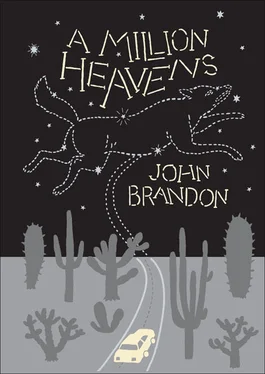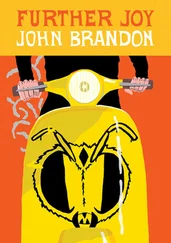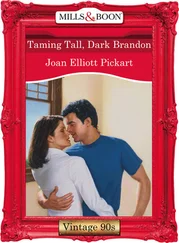Soren’s father set the phone on the table, and then he picked it up and put it in his pocket.
“Are you supposed to sip this or something?” he said, holding his little beer.
Gee shrugged. “Chug it if you want.”
Soren’s father tipped the glass back and emptied it, then flagged down one of the daughters to bring him another. The beer came out and soon after that an appetizer.
“I should put this on the lunch truck,” Soren’s father said. “See how the guys down at the paper processing plant would like some confit.”
“That’s a thing,” Gee said. “Trucks with gourmet food on them. They drive around the downtown office buildings. It makes the lawyers feel alive, buying a meal in cash off the back of a truck.”
“What makes it a confit, anyway?”
“They cook it in its own fat,” said Gee. “The French will do anything to an animal. A lot worse things than confit.”
The main plates came forth, trout that had been cooked on a wood plank and a salad of beets and cactus flowers and different puckery cheeses. Gee ordered wine but Soren’s father stuck with more beer. The food was ridiculously better than the lunch truck food or the clinic food. No denying it. He had the vague feeling of being in someone else’s life. His wife had been good at living, but he could already tell she had nothing on Gee when it came to enjoying things. Soren’s father watched Gee cut her fish into too-large bites and then savor each one. Maybe she would enjoy him that way. Maybe she could force herself into a space in his mind. He could think of her while he sat the hours away at the clinic.
“Since I started writing my memoir,” Gee said, “everything I do feels like a scene from a book.”
“You’re going to write about us having dinner? You’re going to write about us eating trout with the head on it?”
“I don’t know. I have to wait and see if it seems important after some time passes.”
“What made you decide to write a memoir?”
“I noticed a lot of boring people were doing it, and crybabies.”
“You’re not a crybaby, are you?” Soren’s father asked.
Gee smiled. Soren’s father was out of beer again.
“Last Christmas I was in Mexico,” Gee said. “I went hiking.”
Soren’s father had quickly finished his food and he couldn’t tell if he was still hungry. He pushed his plate away.
“This year it kind of slipped by,” he said.
“It’s pointless without children,” Gee said. “Most holidays are.”
“I could’ve put up a little tree in his room and put a gift under it. I got him a bike. It’s at home in the garage.”
“When he wakes up, it’ll be waiting on him. He won’t care he didn’t get it on Christmas.”
“It has training wheels.”
“Sounds like my speed. I never learned how to ride a bike.”
“Why not?”
“I never learned. People always say you never forget how to ride a bike, but I never learned. And I never learned how to whistle.”
“Never learned to whistle?” Soren’s father said. “What do you do when you see a pretty girl?”
“I am a pretty girl,” Gee said.
Soren’s father drew in a breath like he was going to whistle but then didn’t.
“I think I’m getting my wish,” Gee said.
“You are?” “You’re relaxing, just a little.”
Soren’s father saw the girls coming around with dessert and coffee. Gee was swirling the last bit of her wine. He saw her trick. Soren’s father had never once considered that she might not like him. He wasn’t sure how she’d done that. She’d banished all doubt from him without his knowing about it.
“Better finish that,” Soren’s father said. “Coffee’s on the way.”
“I never finish the last sip of wine,” Gee said. “It’s too sad.”
Two nights in a row without one guest. There’d been a band of three couples on Christmas night, each couple getting their own room, and they’d stayed on for the night of the twenty-sixth, but nothing the night of the twenty-seventh and nothing tonight. No laundry. No questions to answer. No coffee to brew in the lobby. Mayor Cabrera, out of spite, flicked on the “no” in the sign. NO VACANCY. When things got too slow at the motel, Mayor Cabrera would think of the old days, when he ran a small roofing company. Roofing was something you could do until you stopped, and then you couldn’t do it anymore. It was too hot and too hard on the back. In the roofing business you worked some punishing hours but then when you were off you were really off. You felt the work in your hands when you held a beer. In the motel business, Mayor Cabrera was always bored and never felt off-duty. He wished he was still roofing, and that he was doing it for Dana, his professional lady. Being in a higher, hotter spot than everyone else all day helped a man, but you had to do it for someone. It was nice to think of Dana when he had a little downtime, but he had nothing but downtime and was thinking about her all the time. He was thinking about her more and harder than he’d ever thought about his wife, back when she was alive. Mayor Cabrera had once had a devoted woman and manual labor, and now he sat in a motel in a dying town, pining for a prostitute.
He went downstairs into the basement. It was a refuge, the basement, but also made him feel closed in. There were a couple high slats of window and now and then the wind would lash sand against the glass. Mayor Cabrera stopped and looked at his calendar, tacked to the wall with a pencil hanging next to it. He used to fill the boxes up with scrunched writing — meetings concerning the town, meetings concerning the motel, his paydays and days off. Lately he left the calendar clean. If he forgot something, he forgot something. Mayor Cabrera cleared some clutter off the old metal desk, scraping a pile of old papers into the trashcan. There were some old granola bars in the pencil drawer and he threw those out too. He paused before pulling open the deep bottom drawer. He knew what was in there. All the potholders his sister-in-law had knitted. There must’ve been a couple hundred. He’d never attempted to sell them. Who would want potholders while they were drifting through the desert? The old rotary phone rang and Mayor Cabrera plucked it off the desktop.
“What’s the word, mayor?”
It was the owner of the motel, Mayor Cabrera’s boss. Mayor Cabrera hoped he wasn’t calling because he was on his way. He was due for a visit.
“How’s shelter renting tonight?”
“Shelter is hardly renting at all,” said Mayor Cabrera.
“That bad?”
Mayor Cabrera knew the motel owner didn’t care if the Javelina made money. He had other businesses that made money. Mayor Cabrera could probably stay at the Javelina until the owner died, and maybe even after, if the owner’s kids decided not to sell the place. Or the owner could die tomorrow and the place could be on the market next week. Both were deflating thoughts, being out of a job or staying at the motel for years to come.
“Is it snowing there?”
“Not that I’ve noticed,” said Mayor Cabrera.
“I heard something about it snowing in New Mexico. One time I was in Old Mexico and it snowed. Did you know it snowed down there?”
The motel owner sounded drunk. Arizona had likely played a basketball game. The motel owner donated small fortunes to University of Arizona, and he judged the quality of each year he spent on earth by how the basketball team performed.
“Oh, wait,” said Mayor Cabrera. It took a lot of effort for him to be dishonest, but he wasn’t going to have a drawn-out conversation with his drunken boss. “I think I hear somebody. Better get up to the office.”
Читать дальше












